





There is a notion in popular culture that artists and designers are solitary geniuses, toiling away in seclusion. Every so often, the story goes, creative visionaries emerge from their isolation to reveal work that astonishes, delights and solves thorny problems. At RISD, we know that artists and designers are astonishing and delightful problem-solvers, but we also know that for creative people to thrive, community is essential. Community is both grounding and uplifting; it provides the conditions in which artists can question, learn, exchange ideas, explore and invent. In community, solutions emerge and acts of kindness and generosity transform lives and futures.
Although I am a relative newcomer to RISD, having joined the institution as vice president of Institutional Advancement in February, I am a longtime advocate and strategist for higher education and arts. I have long understood the tremendous impact RISD has on our global creative commons, and I am honored and delighted to work with RISD’s extended community to further strengthen the college and museum.
I know I am not alone in fervently believing in RISD’s mission and wishing to advance it, because over the past several months, speaking with RISD’s many dedicated donors, volunteers and others, it has become clear to me how deeply members of this community care for one another and for the legacy and future of the institution, and it is easy to understand why. There is a great need and demand for the innovation, creativity, joyful humanity and critical thinking that RISD fosters, and a deep desire to ensure that the RISD experiences that were formative for today’s creative leaders are accessible to future generations.
We, as an institution, are grateful for all who support us with their time and presence, including those whose stories we tell in these pages. On campus, across the country and around the world, we see the impact of RISD’s creative leadership and generosity.
President Williams recently traveled to the inaugural Design Doha 2024 spearheaded by RISD Trustee Her Excellency Sheikha Al Mayassa bint Hamad bin Khalifa Al Thani. She was thrilled to be united with enthusiastic alumni attending and participating in the event. Our alums continue to engage and influence the art and design world on a global scale.
As I look ahead, I am optimistic about our collective future, because I see our community taking action— whether establishing fellowships, giving to the Materials Fund, the RISD Fund or other priorities— to reinforce what is so singular about RISD. It is a place of limitless possibility, where students are encouraged to start creating by beginning with deep questioning. That means they often move into unknown territories, but never on their own. Always at hand are people offering mentorship, advice, materials, opportunities, financial aid and encouragement.
As RISD approaches its 150th anniversary under the visionary leadership of President Williams, I believe that this is the moment for our community to come together to ensure a strong future for this cherished and inimitable institution. I look forward to hearing from you, learning more and partnering with you in this endeavor, and I thank you for all that you do.
Amanda Clark MacMullan Vice President of Institutional AdvancementINSTITUTIONAL ADVANCEMENT AT RISD
The Institutional Advancement division is dedicated to advancing RISD’s mission by fostering lifelong relationships with alumni, parents, friends and organizations to strengthen goodwill and philanthropy.
PHON E 401 454-6403 toll-free: 844 454-1877
EMAI L giving@risd.edu
WEB alumni.risd.edu families.risd.edu
risd.edu/givi ng risdnetwork.risd.edu risdmuseum.org
SOCIAL instagram.com/risdalumni facebook.com/risd.alumni.relations instagram.com/risdmuseum facebook.com/risdmuseum
Momentum is a magazine about donor and volunteer impact from Institutional Advancement, Rhode Island School of Design © 2024


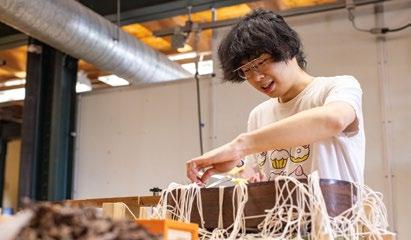
EXPLORING NEW DIMENSIONS
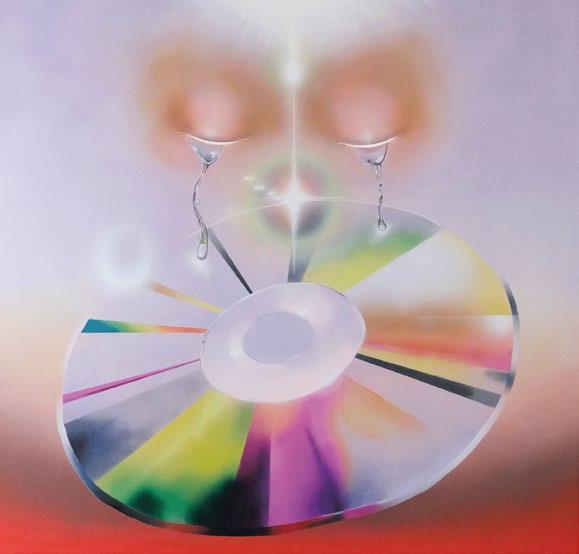
Support from the Materials Fund allowed Ji Zou MFA 24 IL to purchase paints, canvases and frames and create pieces like Delivered by a Meteorite, above.
Thanks to donors to the Materials Fund, students have access to the supplies that can turn an idea into reality.
Jars of paint, bolts of fabric, sheets of metal, foam boards, sketchbooks, canvases—depending on a student’s major and project vision, their shopping list can get pretty long. And expensive.
RISD is a place of experimentation, pushing boundaries and following through on a bold idea. To develop as critical makers, students must be guided by their vision rather than by worries about the final total at the RISD Store or Jerry’s Artarama.
The Materials Fund allows students who qualify for financial aid to submit their projects to a faculty review board and receive funding for supplies.
Jennaca Davies MFA 07 JM, an alumna as well as a member of the faculty review board and critic in Industrial Design, says, “As artists and designers, we are not buying books for our courses. We’re buying materials, and those materials are often specialty, hard to find and more expensive than a standard textbook. The Materials Fund gives students an opportunity to explore in a way that they wouldn’t be able to otherwise.”
Elissa Scott Della-Piana 64 IL, a donor to the Materials Fund, knows that experimenting with media can create new opportunities. Early in her journey as an illustrator, she began incorporating fabric into her designs, which she says led to an unexpected career turn as a costume designer.
Elissa Scott Della-Piana
in her studio as a senior, says that the generosity she experienced from her fellow students is one of the things that motivates her to give to the Materials Fund today.
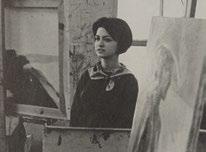
Alan and Fuyumi Cannon P 19 have supported the Materials Fund on an annual basis since 2017. Alan says that their daughter, Maya Cannon 19 PR, interned at a traditional papermaker in Tokushima, Japan, and continued to experiment with the form, which of course required her to invest in supplies. When considering a gift to RISD, Alan remembered Maya’s experience and directed the family’s support to the Materials Fund.
“The combination of Japanese appreciation for natural materials and the recognition that materials can be key to making but are not covered by traditional financial aid made the Materials Fund a natural fit for us,” he says.
Davies says that the Materials Fund benefits students beyond support for a particular project.
“When students submit an application, they have to lay out their plans. This teaches them about professional practices,” she says. “We have to figure out what we need and why, we have to create a budget and determine a timeline. Students may not ordinarily have to do all that, but it’s something they will certainly do after graduation if they continue as artists and designers. When they leave school with these skills, it gives them an advantage.”
For Della-Piana, supporting the Materials Fund is practical as well as emotional. Thinking about a student with limited access to supplies brings her back to her own days as a young artist.
“I remember going into painting class with an empty palette,” she says. “I’d pass it around and each of my classmates would add a squeeze of paint. Without that, I don’t know what I would have done. My RISD education means everything to me—it made the life I wanted to live. When I think of what RISD has done for me, it just feels right to give.”
To see what the Materials Fund has made possible recently, read on.

Possession by Metal Demon; Interlude; Delivered by a Meteorite; and Parallax
“In this series of paintings, I delve into the profound and often enigmatic realm of dreams, specifically those that emerge from meditations on the female biological reproductive experience. Drawing from a middle-class, creative class perspective, these works aim to explore and articulate the complex interplay of creation, identity and transformation inherent in the female experience. The use of vibrant colors, fluid forms and symbolic imagery invites the viewer into a contemplative space where the boundaries between the physical and the ethereal blur, reflecting the intricate dance of life and creation that defines the female body.
“The Materials Fund allowed me access to paints, canvases and frames. Now these paintings are circulating in various galleries around the world and in New York City! The Materials Fund was crucial to my success.”
“Inspired by curiosity cabinets of the past, this modular scaffold acts as a defined space for collection and curation. Deployed as a “device” at the El Paso Citizen Collection Center, a sorting and waste disposal site for local domestic waste, the cabinet engages with material culture: an altar for the transient objects that define daily life in the neighborhood, and by extension, for the labor and economic forces that produce those objects.

“The Materials Fund significantly offset financial barriers to entering my program and I’m so grateful to be building my foundation toward future financial stability while doing what I love. Being able to complete my assignments without constant anxiety about the costs completely changed my educational experience here at RISD.”
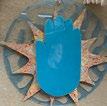

To learn more about supporting the Materials Fund, contact Sarah Caggiano, executive director of the RISD Fund, at 401 454-6799 or scaggian@risd.edu
“I try to have every class project push my knowledge or skills in a new direction. This particular project was the first time I was integrating electronics into an already-complicated interactive piece. It was such a relief to know that there is a fund that was supportive of my vision and my learning experience. I was able to create a project that checked all the boxes of my goals, without having to worry about limiting myself creatively because of financial reasons.
“Thank you very much for the materials, which made this learning experience possible.”
“This piece defines the least labor-intensive method of utilizing knotweed, a nonnative plant. Each bundle was harvested from either Mashapaug Pond, Morley Field in Pawtucket or East Side Train Tunnel Valley and sealed with local beeswax. This is an island made of invasive ecosystems in the middle of a polluted pond. Using the pollution of Gorham Silver on Mashapaug Pond as a case study, this raft uses Gorham’s model of reproduction and subverts it to instead regenerate the environment.
“I want to offer my deepest thanks to each and every donor for allowing me to purchase this unique and local resource of beeswax. Without this funding, I would not have been able to produce something this vibrant.”



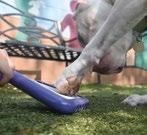

“Onda revolutionizes dog nail care by transforming it into an enjoyable experience for pets and owners, while Sync Touch innovates communication by merging touch and sound experiences through advanced haptic technology, fostering a sense of presence.
“With Onda, my goal was to simplify daily routines while strengthening the bond between pets and their human companions. The inclusion of replaceable scratchpads provides a convenient solution for maintaining effectiveness over time.
“Users interact with Sync Touch by touching and manipulating the device, generating unique tones with each touch. When two users produce matching tones, it triggers a vibration response. Because it operates on a feedback loop, user input influences subsequent interactions in real-time, enhancing engagement and creating immersive tactile. Thanks to the Materials Fund, I have been able to acquire the necessary materials to create a truly innovative and interactive project.”
Chris Baer 95 ID supports the RISD Fund and the college’s culture of innovation.
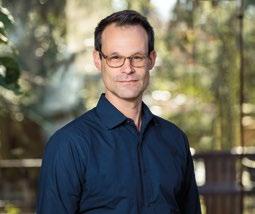 Photo by Tamzin B. Smith
Photo by Tamzin B. Smith
Chris Baer 95 ID says he’s always been curious and willing to take risks. Both of those characteristics served him well when he decided to co-found Sunstone Therapies, a healthcare services and research company committed to advancing the safe, accessible delivery of psychedelic therapies within the medical setting.
“Our medical system is running out of tools to treat mental illness,” he says. “Co-founding Sunstone Therapies and helping to design space for these treatments is exactly what RISD trained me to do: consider new perspectives, try something different and apply design to serve humanity.”
Baer’s appreciation for his RISD training goes back to when he was a high school student visiting campus. He was a creative teenager who liked art class, but design? Design was something new to him. He says that it blew his mind to see all the different ways that students worked with design principles, in disciplines from apparel and animation to architecture and industrial design. He discovered that RISD could help guide him from a person with a lot of creative ideas to someone who could use those ideas to think through complex problems and use design to create solutions that make a difference.
Baer started his career in the early days of web design and strategy and designed digital products for brands big and small. Then, he says, he “made a hop from designing for products and services to designing for the mind and human behavior.” He spent time at Marriott International, eventually overseeing the company’s global leadership development initiatives. His interest in how people behave led to his work with Sunstone Therapies, where he advises the board and advances design principles.
“Working with the co-founders, who are physicians and hospital administrators, we envisioned and created a purpose-built, state-of-the-art center for administering advanced trial psychedelic therapies, using compounds like psilocybin, MDMA and LSD to treat things like PTSD, depression, addiction and other tough psycho-social conditions,” Baer explains.
The resulting space, the Bill Richards Center for Healing, is located in Rockville, Maryland and provides clinical care alongside psychological and emotional support for cancer patients, their families and caregivers. It includes space for individual and group therapy, yoga classes and educational sessions. The building received a 2022 Healthcare Design Award from the International Interior Design Association. In 2023, Sunstone treated more people with trial psychedelic therapies than any other center in the world.
Innovation drives Baer’s work. During his time in leadership development, he realized that innovation largely springs from culture rather than process— if an organization has a culture where people always need to be “right” or fear failure, it is difficult to produce ideas that are truly innovative. Lucky for him, RISD was—and still is—a place where risktaking and new ideas are celebrated, even if they don’t work out according to plan.
Baer recalls a class taught by the late Professor Emeritus Jack Massey. He and a fellow student worked on a project that involved a chimney in an old building on Waterman Street and creating a column of light.
“As Massey was looking at it, the lights in the installation basically exploded. It smashed into bits of glass and was a total disaster. But, he gave us an A because we tried something. It was a failure, but it was also completely cool and awesome, and we learned from it,” Baer says.
Today, in addition to advising the Sunstone team, Baer is the founder of the Mandala Institute, an organization dedicated to helping leaders foster better cultures in work and life.
Baer gives to the RISD Fund to support the culture of innovation that proved formative for his life and career. He is a member of the 1877 Society, a giving society named for the year of the college’s founding that honors donors who make leadership gifts and make it possible to respond to the institution’s most pressing needs. The flexibility to respond to emerging needs means that RISD will continue to grow.
He says, “I’ve seen RISD evolve and make itself available to more people. I believe in that because design brings people together and is for everybody. I want to see RISD continue to be the flagbearer for design, just as it has been for almost 150 years.”
To learn more about supporting the RISD Fund or joining the 1877 Society, contact Sarah Caggiano, executive director of the RISD Fund, at 401 454-6799 or scaggian@risd.edu or make a gift at risd.edu/giving/risd-fund.
“I’ve seen RISD evolve and make itself available to more people. I believe in that because design brings people together and is for everybody."

Through a bequest and a new leadership position, Jill Groeber 96 GD pays it forward.
Collaboration, support and sharing. Those traits, says Jill Groeber 96 GD, become ingrained at RISD, starting with Experimental and Foundation Studies, where first-year students are often in a group environment, learning how to critique each other in full.
“Our first-year foundation was all about presenting work, supporting each other and making our deadlines,” Groeber says. “I think that the nature of being at RISD is sharing knowledge and solving problems. I can’t say I went into RISD with that sort of mindset, but now I see a problem, and I think ‘Let me solve it.’ I have a deep gratitude for my education at RISD and my time there.”
Since graduating, the Brooklyn-based Groeber has stayed close to RISD, through work—she counts
numerous RISD alums as former colleagues at places like Martha Stewart Living Omnimedia, and often meets RISD graduates through her creative agency Studio A2—friendships and volunteering.
Groeber’s volunteerism honors the knowledgesharing ethos instilled in her undergraduate days. Through her involvement with the alumni affinity group RISD Founders and Entrepreneurs, she networks and shares ideas with other RISD alums who have founded their own studios, businesses or organizations, and is among the group that earlier-career students and recent graduates can tap for mentorship. As a member of the leadership team of the RISD Alumni Club of New York City, she has helped build a robust community who support thoughtful dialogue and connection through events like exhibitions, artist talks, book drives and
“I wanted to leave a legacy gift. I can’t necessarily give now, but I definitely could give later, and the Metcalf Society allows me to do that.”
more. If she meets a recent RISD alum at a photoshoot, she makes a point to talk with them about their experiences and helps them plug into the resources the larger NYC-based RISD community can offer.
Groeber was thinking about her own connection to RISD when she learned about the Jesse + Helen Rowe Metcalf Society at a RISD event. The Metcalf Society comprises donors who have incorporated the college and/or museum into their estate plans.
Estate planning can be a strange topic to broach, Groeber says, because it asks people to think about their end-of-life plans, and the legacy they want to leave. As a superstitious person herself, she says, it can be difficult to think about creating a will, but the Metcalf Society provides people who know they want to support RISD in perpetuity with community and a shared purpose.
“I wanted to leave a legacy gift,” Groeber says. “I can’t necessarily give now, but I definitely could give later, and the Metcalf Society allows me to do that.”
Ever the volunteer, Groeber did not simply join the Metcalf Society by making a bequest in support of a scholarship through the Jill Groeber (96 GD) Fund; she will also be the Metcalf Society chair beginning July 1, 2024, as outgoing Chair Jutta-Annette Page PhD MAE 86 concludes her three-year term.
Looking ahead, Groeber is eager to work with Page on the leadership transition, think about broad goals, use her graphic design and communications expertise to reach the RISD community where they are and ask the classic RISD question: how can I innovate?
“Always in the back of my head I think about offering up more opportunities for people who might not be able to have them,” Groeber says. “I’m so glad there’s a way I can help the college now with my time and later, with money.”
To learn more about the Jesse + Helen Rowe Metcalf Society and planned giving at RISD, please contact Amy Duffell, senior planned giving officer, at 401 277-4968 or aduffell@risd.edu.
The RISD community extends its heartfelt thanks to Jutta-Annette Page PhD MAE 86, who has led the Metcalf Society for a threeyear period during which planned gifts to RISD have grown markedly.
Page, who grew up in Germany, studied jewelry design and art history and had a long career as a glass and decorative arts curator. Shortly before taking the helm of the Metcalf Society in 2021, she retired from her role as the founding director of the Barry Art Museum at Old Dominion University.
Through a bequest, Page will endow a scholarship fund supporting international students. As chair of the Metcalf Society, she focused on making planned giving accessible to all, regardless of income.
“Giving back and paying forward are both a privilege and an obligation. The arts are notoriously underfunded, though their value and importance to society has been demonstrated time and again,” she says. “Supporting RISD ensures the continuation of unique educational opportunities for future generations of art students.”
We thank Page for her generosity, dedication and service on behalf of creating a strong future for the college and museum.

Graciela Batista 24 IL connects with artists of all ages through volunteer work and internships.

When Graciela Batista 24 IL was in high school, she took art classes and followed the lead of her teacher, who encouraged her to experiment with painting, drawing and collage. She attended a pre-college art program and enjoyed it, but still had doubts. Was she an artist, or simply a person who liked to draw?
“When I was accepted to RISD, it was extremely validating. I was like, ‘Wait a damn minute! Maybe I can be an artist.’ The fact that RISD saw something in me gave me the push I needed,” she says.
Her decision to major in Illustration was motivated by her desire to write and illustrate Spanish-language children’s books, something she felt was lacking in her childhood. Born in Chicago, Batista spent most of her childhood in Orlando before moving to Puerto Rico at age 10.
Batista, who receives scholarship support, realized there might be a different path to her goals after an internship at a publishing company. “I realized that when I thought of children’s books, what I really wanted was connection with my community,” she says.
“It was fun to work with kids and share what I’ve learned at RISD. . . And through ¡CityArts!, I’ve met many super cool Providence artists and been able to see how people actually live and make art here.”
Providence artists and been able to see how people actually live and make art here.”
Batista has also worked with Project Open Door, a RISD program that provides free programming to Rhode Island teens in underserved communities, and with RISD Art Circle, a group of young artists who promote community collaborations and handson activities in the museum’s galleries. In spring 2024, Batista taught a creative writing class with Project Open Door.
Remembering her move, Batista says, “I refused to speak Spanish for two years. I hated it. But then, it started to feel really important to be from Puerto Rico and I realized it was unfair to myself to neglect my heritage.”
She adds, “I always felt I had a home in the States and moving back for school felt right. Here, I can really connect with both cultures and inform others about how Puerto Rico shaped my being and personality.”
Batista found the ability to connect with people in courses that allowed her to design for hypothetical community solutions and another that focused on woodworking and building toys. She designed the program for Super Art Sunday, an annual RISD Museum event that hosts art-making activities for children and their families, free of charge.
Through internships and volunteer positions, Batista has worked with local artists and community members in Providence and farther afield. The summer after completing her freshman year, Batista began volunteering with ¡CityArts!, an organization that provides free in-school, after-school and summer arts education to Providence students ages eight to fourteen. She loved it so much she was able to secure a work study position to continue on through her sophomore year.
“It was fun to work with kids and share what I’ve learned at RISD,” she says. “It also gave me a community that I didn’t have on College Hill; I was able to connect with Puerto Rican and Dominican kids and really feel like I was giving back. And through ¡CityArts!, I’ve met many super cool
Batista also completed an internship at 826LA, a nonprofit writing and tutoring center with chapters across the country, with the support of a Maharam STEAM Fellowship in Applied Art and Design. The fellowship program supports RISD students pursuing work that advances sustainability and social justice.
She says, “826LA hosts a two-week summer camp for teens and I got to be there as they planned the curriculum and recruited, welcomed and taught students. It was awesome. And it feels really important. When you work with kids, you can make a difference in their lives.”
Reflecting on being accepted to RISD and receiving a scholarship, Batista says that those things were a bit of a surprise. They made her reconsider her assessment of her own talent and ability to excel as an artist. But receiving the Maharam STEAM Fellowship felt different. That, she says, felt just right.
“I’ve continuously demonstrated my interest in working with nonprofits and it was special to me that RISD recognized that commitment,” she says.
“I’m proud to share my community work because I want to push more people to consider it. This work is important for our communities and for our artistic practice—it both grounds us and keeps us going.”
To learn more about supporting scholarships and fellowships at RISD, contact Vice President of Institutional Advancement Amanda Clark MacMullan at 401 454-6532 or amacmull@risd.edu.

When Rosalie “Randy” Halsey Frost 59 GD P 97 was weighing whether to attend RISD, she and her mother met with the school’s president at the time, Max Sullivan.
“My mother asked one critical question,” Frost recounts. “She said, ‘How can you determine whether an applicant is really appropriate for this school?’ And he said, ‘Talent, direction and most of all, drive. We can tell about the first two, but about the third...We only find out when they get here.’”
As it turned out, Randy, a quilt artist, painter and educator, is a person of tremendous drive, a trait she shares with her husband, architect Corwin “Corky” Frost 59 AR P 97 and their children, artist and entrepreneur Anne Frost Morse 97 GD and artisan and architectural designer Halsey Frost. The Frosts’ family story is one of nearly boundless creative output, spanning media and industries. It was written, in part, at RISD.
Randy and Corky were first introduced by a mutual friend in New York City before they got to know each other on campus. Randy was pursuing a BFA in Graphic Design, and Corky was about to enter as a graduate student in Architecture. Randy loved RISD from the day she walked into her first class, she says. Corky was drawn to the Architecture program’s artistic orientation, which differed from the more practical study of architecture he had been exposed to as an undergraduate at Princeton University. Both grew up near New York City, so the pair often carpooled home for school breaks.
“Randy and I met at RISD and because of RISD. We wanted to recognize the institution with a bequest and endowment. Speaking for both of us, it felt like the right thing to do.”
Shortly after graduating, they married. Now, with distinguished professional careers that encompass architecture, consulting, advertising, painting, graphic design and fiber art, and a rich family life as the parents and grandparents of artists, the Bronxville, NY residents will retrace their route back to RISD to celebrate their 65th reunion in 2024 and serve as reunion class volunteers.
After graduating in 1959, the Frosts began careers that aligned with their parents’ experiences: Corky felt he was foreordained to be an architect like his father and grandfather, he says, and joined the firm Harrison & Abramovitz, working on projects like Lincoln Center and La Guardia Airport. Randy entered advertising, a field in which her father had worked, but found the sexist, Mad Men-like atmosphere of the industry at the time distasteful, and rediscovered painting.
Randy had always worked extensively in fiber and sewing as well as painting, drawing and collage, she says, but a journalism assignment about a quilt artist inspired her to work with fabric in a new way. “I started playing around with it,” she says, “and I’ve never stopped. I constantly see possibilities in quilting, which doesn’t have to be what is traditionally thought of as quilting. It is image-making, it is three dimensional, it is just delightful.” Her fabric-based work has been collected by museums, shown widely and commissioned.
Corky’s award-winning career included working for his family firm, Frost Associates, in roles ranging from draftsman to partner. He went on to oversee architecture and engineering hiring for CBS, Inc. and the 20 campuses of the City University of New York. Later, a six-month gig consulting for the Newark, New Jersey Public Schools turned into a 20-year consulting post. While all this was unfolding, Corky, now an emeritus trustee, served multiple terms on RISD’s Board of Trustees—a role his father, Frederick Frost Jr. had also held in the 1960s—was a member of the Alumni Council and chaired the RISD Fund, then known as the Annual Fund, in the early 1990s. “It’s been a variable career,” Corky
says, “but it has all been devoted to architecture in one form or another and Randy and this wonderful family.”
In the lead-up to their 65th reunion, the Frosts made plans to express, through bequests, their dedication to art and design education at the college and museum. They plan to donate their 500+ volume architectural library to Fleet Library. Including works that were published in the 19th century, the collection is a rich resource for research and teaching. In addition, the couple is establishing the Corwin (“Corky”) Frost 59 AR P 97 and Rosalie (“Randy”) Halsey Frost 59 GD P 97 Fund through a planned gift, and joining the Jesse + Helen Rowe Metcalf Society in the process. This endowed fund will help build a permanent funding source for the library’s critical services, from acquisitions and exhibitions to publications, events and digital resources.
“We are so grateful for this dual support from the Frosts,” says Margot McIlwain Nishimura, dean of libraries. “The book collection will deepen and enrich our resources for the study of architecture and other areas of design, while the endowment supports the instruction, programming and services we provide to students, faculty and researchers. This goes to the heart of what we do, and ensures the vitality of our collections well into the future.”
“Randy and I met at RISD and because of RISD,” Corky says. “We wanted to recognize the institution with a bequest and endowment. Speaking for both of us, it felt like the right thing to do.”
To learn more about the Jesse + Helen Rowe Metcalf Society and planned giving at RISD, please contact Amy Duffell, senior planned giving officer, at 401 277-3151 or aduffell@risd.edu.

A community-informed curatorial process brings the life and work of Nancy Elizabeth Prophet into sharp relief at the RISD Museum.

At left: Nancy Elizabeth Prophet in Paris in 1924, the year Head of a Negro, above, was shown at the city’s Salon d’Automne exhibition. Portrait courtesy of Rhode Island College’s James P. Adams Library. Installation photo courtesy of RISD Museum.
In a glass case in the RISD Museum is the diary of Nancy Elizabeth Prophet, the 20th-century sculptor and Rhode Island native who was one of the first known women of color to graduate from RISD. The entry for March 10, 1929 reads simply “Starvation.” The next entry, from March 29, bears just the phrase “I will not bend an inch.”
That is the source for the title Nancy Elizabeth Prophet: I Will Not Bend an Inch, an exhibition that opened at the RISD Museum on February 17, 2024 and is on view until August. The exhibition includes marble and wood sculptures, painted wood friezes, watercolors and photographs of archival documents and lost works.
Today, Prophet’s sculptures are widely appreciated for their depth of presence, uniquely straddling European classical traditions and modernist sensibilities. But in 1929, as an expatriate artist living in Paris, she was underrecognized and battling the art world structures that excluded her as a woman of African American and Narragansett heritage. Her importance as an artist, as well as the struggle and formidable spirit her diary entries reveal, have long inspired community members in her home state and elsewhere to delve into her life and work.
Thus, when the RISD Museum began planning an exhibition of Prophet’s work and archive, museum
staff invited artists, scholars, neighbors, activists and others whom they knew had explored the artist’s life and work to participate in shaping the show. This consultative curatorial process, refined over years of exhibitions, ensures the museum is accessible, accountable and responsive to the community in which it resides.
“We at the RISD Museum did not take the position that we are the authority on Nancy Elizabeth Prophet just because we hold her work and this is her alma mater,” says Kajette Solomon, the museum’s social equity and inclusion specialist and a co-curator of the exhibition. “Prophet was born in Warwick, interred in Pawtucket and she is wellknown and beloved in the state. We invited input and thought partnership with community members who we knew were invested in her legacy, and it grew from there.”
In 2022, Solomon, with co-curators Sarah Ganz Blythe P 22, deputy director of exhibitions, education and programs and Dominic Molon, interim chief curator and Richard Brown Baker Curator of Contemporary Art, held an initial community convening to explore the scope and content of the show. Additional meetings with more participants followed, with community members like Sylvia Ann Soares, who has staged dramatic performances based on Prophet’s diaries; Ray Rickman, executive
director of the nonprofit Stages of Freedom; Nancy Whipple Grinnell, curator emerita at the Newport Art Museum; Lorén Spears, executive director of the Tomaquag Museum; professor and historian Mack H. Scott III and others. In addition to yielding new archival material and a new work included in the show, their input and insight, along with that of many others, was essential to creating an exhibition that fully celebrates Prophet’s life and work.
“It was a wonderful, iterative process,” Ganz Blythe says. “Starting with what we knew, we also wanted to learn from the knowledge existing in the community. We presented stages of the project to the group so they could see where all their feedback led us, and encouraged them to invite more people to the conversation.”
Solomon and Ganz Blythe say that bringing in community members early is key to creating a responsive, community-centered museum. Often, Ganz Blythe says, museums ask for input at the end of exhibition planning, when there is not much time to receive impactful feedback or to be responsive to it.
At the RISD Museum, community involvement in curation goes back at least a decade. For a 2014 show called Locally Made, which aimed to reflect Providence’s creative community, curators worked with both RISD graduates and the many area artists who are not alumni. That was a moment, Ganz Blythe recalls, when staff needed to think through what it meant to be more responsive to the creative community, what avenues to pursue and how to reach out beyond the institution.
That set the stage for additional community-centered work leading up to the 2019 debut of Gorham Silver: Designing Brilliance 1850-1970. The exhibition focused on the Gorham Manufacturing Company, a major employer in Rhode Island and a one-time worldwide industry leader in creating silver products. Curators visited community libraries and sites impacted by the company, like Mashapaug Pond, which was contaminated by chemicals discharged from the factory. They gathered stories from residents about what it was like to work at the factory and considered Gorham’s social impact in planning the show. For museum workers, that process “is not about the objects, it’s about a relational way of working,” Ganz Blythe says.
Dialogue with practicing artists, local teachers, student groups and members of the public was also central to a major 2022 reinstallation project. With community input, the museum reimagined 9000 square feet of gallery space dedicated to 20th and 21st century art. The resulting galleries draw connections across perspectives, cultures and media, and allow visitors to experience contemporary and modern art in a global context.
“We at the RISD Museum did not take the position that we are the authority on Nancy Elizabeth Prophet just because we hold her work and this is her alma mater.”



“For us, one thing that was very important to think about was how, when we collect artists’ work, do we actually talk to the artists about how they might imagine their work being shown? For alumni artists, what were their perceptions of the museum when they were students? How does it feel to have their work displayed?” Ganz Blythe says.
With the Prophet exhibition, what the artist wanted, according to her diaries and letters, was top-ofmind for the curators. Prophet never had a solo exhibition during her lifetime, Molon notes, which is something that can signal an artist has “arrived.” And yet, the curators make clear, this solo exhibition is not the final word on Prophet, but a start. Molon says he hopes this exhibit, which will travel to the Brooklyn Museum and the Spelman College Museum of Fine Art in 2025, will “shake the tree” and yield more about Prophet, just as the group effort of all those who helped shape the show added dimension and depth to this artist finally beginning to get her due.

sure the RISD spirit is alive and well in Hong Kong.
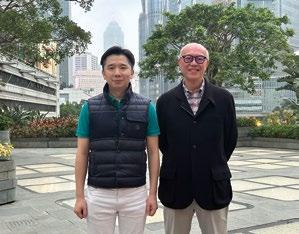
Some 8,000 miles separate RISD’s campus and Hong Kong’s Central Market. But for one night in November 2023, the distance didn’t matter. RISD graduates from across four decades met, mingled and reminisced; President Williams shared stories of student work and new campus initiatives.
It was exactly these types of connections—among alumni and between alumni and the college—that Donald Choi BArch 82 and Rex Wong BArch 03 hoped to foster when they founded the RISD Club of Hong Kong in 2010.
Wong remembers, “At the time, there were small groups of alumni from the ’80s, ’90s and 2000s that would meet. Donald and I wanted to pull the groups together for a more formal club. And it quickly became a really nice community of people, whether they graduated recently or decades ago, able to connect and share things like our favorite places in Providence or memories of working with different professors.”
The transition from informal get-togethers to an official club gave alumni in Hong Kong a more direct line to RISD.
“Connection with the school became one of our goals,” Choi says. “We want to know what’s going on back in Providence and it is important for RISD to have an understanding of the local culture in Hong Kong and the work that our alumni do.”
Choi and Wong have maintained close ties to RISD. Choi, executive director and CEO of the Chinachem Group and former president of the Hong Kong Institute of Architects, serves on the Board of Trustees. Wong, CEO of Kum Shing Holdings, is an ex-officio Trustee and president of the Alumni Association. Despite demanding careers, they both make time for their alma mater.
“I don’t engage with art and design production on a daily basis, but I remain passionately interested. There’s still a place for me at RISD and it’s empowering and motivating to know that I can help,” Wong says.
Summer welcome events are an example of the relationship between the college and the club. In 2015, the Hong Kong Club hosted an event for


admitted students and their families, welcoming them to the RISD community and offering encouragement. Inspired by the event’s success, RISD staff supported other regional clubs in hosting similar gatherings.
Choi and Wong share that members of the Hong Kong Club engage with each other and the local art and design community in a variety of ways. They work with charitable organizations and local schools, sometimes in conjunction with RISD’s Founders Day celebrations, to offer hands-on workshops or portfolio reviews. The club gathers for social events, like a Christmas party inspired by the Artist Ball.
For Choi, a memorable event in 2017 highlights the myriad ways in which Hong Kong alumni make a difference for RISD. When a number of RISD graduates were in town for an architecture conference, the club invited them to a dinner with new students and their families.
Choi and Wong enjoy a variety of events with members of the RISD Club of Hong Kong, from meeting with President Williams to celebrations reminiscent of student days.
“These graduates talked about their career paths and why a RISD education is transformative. We were also able to use the event as an opportunity to fundraise for a RISD Hong Kong scholarship. It was really something incredible,” says Choi.
Wong stresses that no matter where you are on your post-graduation journey, your local alumni club can be there for you.
“People are always in transition,” he says. “It may be from school to work or between careers. It may be a geographical transition or a new phase in life. The alumni community will always be a place to find common values and it can really serve as an anchor.”
Choi dedicates so much to the Hong Kong Club because of what RISD has meant to him—in his student days and now.
“RISD is why I still have dreams,” he says. “It was quite transformative. I got to understand myself so much more. When I experience challenges in my career, I go back to my RISD education to understand the best approach. With the alumni club, I want to share that RISD spirit with our community.”
To learn more about alumni clubs, visit alumni.risd.edu/regional-clubs

Support from three scholarships helped Yichen Li 25 ID find his passion.
As a high school student in Bedford, Massachusetts, Yichen Li 25 ID focused his energies on figurative oil painting while nurturing an interest in photography and helping produce a school magazine. Interested in painting as a medium for storytelling and exploring his Chinese heritage and identity—his family emigrated to the United States from Guangzhou, China when he was in middle school—he originally thought he would major in Painting at RISD. After his Experimental and Foundation Studies year, however, Li chose to major in Industrial Design.
"My life took a transformative turn when I enrolled at RISD. The experience here has shifted my artistic focus from the two-dimensional world to the three-dimensional realm. I’ve discovered a deep passion for creating and designing tangible, interactive objects that blend abstract aesthetics with functionality,” Li says.
In addition to building furniture and objects, he has built a nylon string classical guitar and an electric guqin, a seven-string Chinese musical instrument sometimes referred to as a Chinese zither. Building a musical instrument is a complex process, and Li, who taught himself about acoustics, worked closely with Industrial Design faculty and technicians who offered essential instruction and support. Peter Lutz, a critic who teaches the course Wood II, helped Li master the woodshop’s machines, and Senior Critic George Gordon was particularly helpful, Li says. “He was able to solve all my wood-related problems.”
The material exploration that is at the heart of RISD classes has given Li a deep understanding of which woods are best for specific instruments. Cedar and spruce, for example, are most suitable for soundboards, he says, because of their weight-tostrength ratio. This means they are strong but flexible. Li is also a musician, and as someone who both makes and plays his instruments, he is able in a profound, direct way to connect how an instrument is made with how it will be played and the quality of sound it will produce.
Every Saturday, Li takes the train to Boston for guitar classes, which offers him a chance to meet up in the city with family. His family, especially his mother, he says, have been deeply supportive of his creative path and choice to attend RISD.
Helping Li along that path is financial aid. He is the recipient of the Fred M. Roddy Memorial Scholarship, the Aiden Petrie (MID 85) and Stephen Lane (BID 85 P 16 P 11) Scholarship and the Mary E. Wardwell Scholarship. Li feels honored to receive such financial support, he says, and is inspired to fully embrace all RISD has to offer. That includes working collaboratively on projects like a chair made with wood and metal elements. Group projects with peers who have different disciplinary strengths “works especially when the object needs expertise in different media,” Li says. He also has continued to investigate two-dimensional work and at times mixes it with three-dimensional work, like exploring bookbinding so he can create photo books.
“My life took a transformative turn when I enrolled at RISD.”
Looking ahead, Li hopes to learn how to work with a computer numerical control (CNC) router, a machine designed to carve out complex shapes from soft materials like wood. CNC routers are often used in modern guitar-making or in creating things with complex curvatures.
Such machinery is particularly helpful when making multiples of a design, Li says. “Once you stand up the process, you can iterate. But even if a piece is 99 percent machined, one percent of it is fixed by hand.” For that reason, he says, RISD’s emphasis on working with hand tools is critical. Post-graduation, Li is interested in the possibility of establishing his own studio and woodshop, making furniture, and perhaps apprenticing with a luthier. Until then, he says, “I am committed to making the most of this incredible opportunity.”
To learn more about scholarship giving, contact Vice President of Institutional Advancement Amanda Clark MacMullan at 401 454-6532 or amacmull@risd.edu.
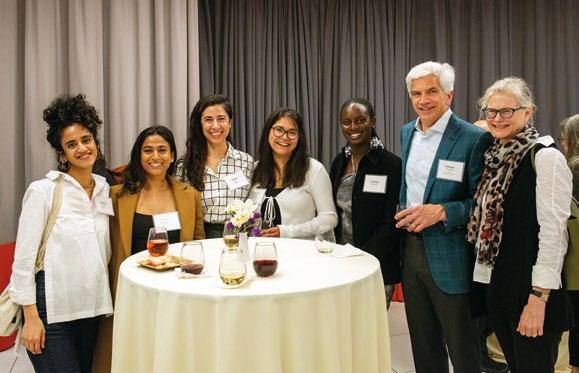
Through talking with students, Suzanne and Fabian Fondriest P 16 get insight into the unique skills and perspectives that their scholarship giving supports.
Suzanne and Fabian Fondriest (right) connect with students at Celebration of Scholarships.As parent volunteers with RISD Admissions, Suzanne and Fabian Fondriest P 16 talked to newly admitted students still making decisions about where to attend college. This led to some great conversations, but some difficult ones, too.
“A number of times, we heard a student say, ‘I’ve always wanted to go to RISD and it’s the best place for me. But even with financial aid, I can’t afford it.’ There were a lot of families having to make tough choices,” says Fabian.
When he was asked to join the RISD finance committee and later the Board of Trustees, Fabian had those conversations in mind. Most of his previous philanthropic and volunteer work had been in education, and he and Suzanne want to ensure that arts education is available to talented, passionate students regardless of their financial backgrounds. So, Fabian joined the Board and he and Suzanne created the Fondriest Family Endowed Scholarship and contributed to the RISD Scholars Fund. They also support the RISD Fund and Museum Annual Fund.
“I want to support the arts and humanities,” says Suzanne. “There is a real value in visual language and communicating through design. I want to help students with those interests as much as I can. RISD’s students have skills that are so important to society. If we can help even one person with those skills attend this school—the leader in its field— that’s great.”
Fabian adds, “I grew up in an immigrant household in New York City, where Italian was my first language. I benefited from a lot of generosity throughout my education. That’s one reason why Suzanne and I support scholarships, at RISD and other schools.
They recognized the skills and unique perspectives of RISD students as their daughter, Natalie Fondriest BRDD 16 IL, worked on her wide range of assignments and projects during her time there.
Fabian and Suzanne continue to relish the opportunity to connect with students. When Natalie was a student, these connections would happen when
they visited her on campus. They recall the excitement of visiting studios on Families Weekend and witnessing students show off their tools and projects with insight and enthusiasm.
“RISD’s students have skills that are so important to society. If we can help even one person with those skills attend this school— the leader in its field—that’s great.”
Now, Suzanne and Fabian look forward to Celebration of Scholarships, an event to celebrate scholarship donors and student recipients, held each spring. There, the Fondriests have the opportunity to meet the recipients of their scholarships and talk with other students.
In May 2024, Fabian co-hosted the event with President Williams.
“I’m the old guy walking up to a group of students and asking what they’re working on,” Fabian says, laughing. “But they are happy to talk! I love hearing their stories, how they got here and what they want for the future.”
Suzanne appreciates the openness and curiosity of RISD as an institution, as well as its students.
“From the beginning, RISD seemed like a place where there was an openness to whatever students were bringing to the table and a willingness to challenge, support and develop the direction they wanted to take things,” she says. “This is what makes RISD special.”
To learn more about scholarship giving, contact Vice President of Institutional Advancement Amanda Clark MacMullan at 401 454-6532 or amacmull@risd.edu.

To solve the problem of unsustainable production, Samuel Aguirre MFA 24 FD draws on RISD’s culture of collaboration and critique.
Samuel Aguirre MFA 24 FD lived in Brooklyn, NY for a decade before moving to Providence to attend RISD. Although he was busy raising a family with his partner and working, first in construction management and then business development for a company specializing in architectural products, he also made time to build furniture on the side.
He fell in love with the world of furniture after visiting the International Contemporary Furniture Fair, he says, and realized that was the work he wanted to pursue. Aguirre found studio space in the Brooklyn Navy Yard, accumulated tools and skills, and eventually created a body of work that he sold through a gallery. That work comprised the portfolio that got him into RISD.
“Coming to RISD was about making time for furniture making,” Aguirre says, though that choice was not an easy one to make. “I think being a father of two and coming back to school with my partner and leaving our life in Brooklyn...financially, it was very difficult.”
Fellowship and Materials Fund support have helped propel Aguirre’s career at RISD. He is the recipient of one of two Windgate Foundation Scholarships awarded annually to students working in programs focused on metals, wood, ceramics and textiles, and his project Exploring Upholstery, which experimented with commercial grade, compostable furniture and objects using commercially available materials, was made possible through a successful application to the Materials Fund.
“Securing financial aid and fellowships made a huge impact,” Aguirre says, for both him and his family. His family life has also inspired his research.
Aguirre’s interest in compostable materials was sparked in part by making papier-mâché toys with his son, back when they were living in Brooklyn.
“This work began as a project with my son to make papier-mâché helmets and toys,” Aguirre says. “We were originally motivated to make our process and material compostable for a clear conscience and easy disposal. Over time we found the objects we made to be extremely resilient and structurally sound. So much so that the toys we made a few years ago are still in the toy bin today, in the same condition as when we made them.”
As he investigated using compostable materials and means of fostering a circular economy, in which materials or products can be reused or regenerated, Aguirre sought feedback and thought partnership. He found just that in Senior Critic Daniel Heyman, a printmaker who founded and leads the papermaking program at RISD, and Tony Torres MFA 25 PR. Heyman’s guidance, knowledge and collaborative

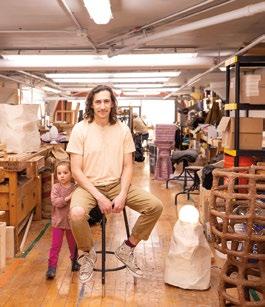
“Being a father of two and coming back to school with my partner and leaving our life in Brooklyn. . . financially, it was very difficult. Securing financial aid and fellowships made a huge impact.”
spirit have been instrumental, Aguirre says, in developing new ways to use traditional paper making materials in furniture.
Through Heyman, Aguirre met Torres, his partner in creating a chair and a credenza framed in ash and wrapped in mulberry fibers. This technique is similar to amate, a Mesoamerican papermaking process that uses plant-based, rapidly renewable materials.
“The pieces lean on the inherent environmental benefits of papermaking craft and raise questions
Aguirre explores materials and processes that present new possibilities for sustainable furniture manufacturing.
about the contemporary application of pre-industrial processes,” Aguirre says. Also intended to raise questions about the expected lifespan of furniture, the credenza and chair were shown in April at Salone del Mobile, the largest annual furniture design fair in the world in Milan.
Aguirre has also been open to outside partnerships. In the summer of 2023, he won a Maharam STEAM Fellowship in Applied Art and Design to work with What Cheer Flower Farm in Providence. A nonprofit agriculture and floristry center, What Cheer aims to bring solace and joy to the community by giving away thousands of flowers annually, hosting a variety of workshops and supporting the local economy via job training. Aguirre designed a 12-foot-tall sculpture that serves as a landmark for the farm’s new, tuckedaway space on former factory land in the Olneyville neighborhood. The fellowship provided a singular opportunity to operate in a creative capacity with a nonprofit that shares his values, Aguirre says, and the relationship may lead to more work together in the future.
Looking ahead, Aguirre says he would love to partner with industry and scale some of the designs that he has developed, building on his experience collaborating and problem-solving to address manufacturing’s wastefulness and dependence on petroleum-based products.
“This experience is craft-based and experimental, so the recipe is there to pursue something that may not be practical at first or immediately resonate with an audience,” Aguirre says, “but it is a crucial step in the iterative process. Sometimes we’re planting seeds, sometimes we’re harvesting.”
To learn more about supporting graduate fellowships, contact Vice President of Institutional Advancement Amanda Clark MacMullan at 401 454-6532 or amacmull@risd.edu.
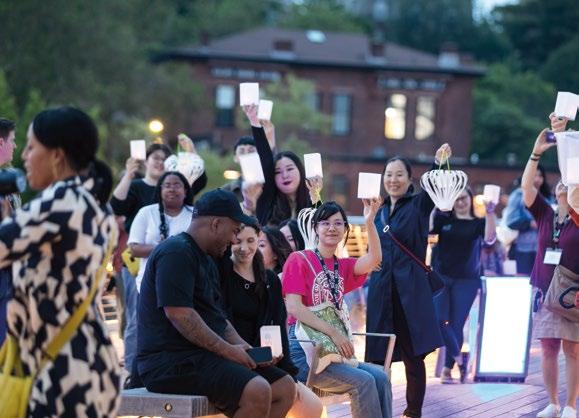


To find files: For Testing > SHAREDATA > Indicias (Per mit Impr int) > 06 indicias (eps outlines)